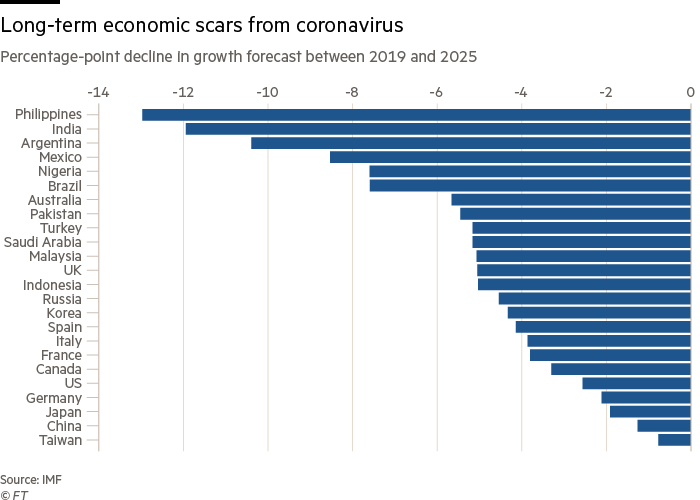The coronavirus crisis will wreak “lasting damage” on people’s living standards across the world and taxes on the rich and on companies may have to rise to address this economic harm, the IMF has warned.
The pandemic will leave significant scars on the global economy in the form of job losses and bankruptcies and whole sectors of the economy will be left unviable, according to the fund’s first medium-term forecasts since the onset of the virus.
This damage will persist because the adjustment from struggling sectors such as travel to expanding ones such as digital technology will inevitably be slow and painful for many people, the IMF said in its twice-yearly World Economic Outlook, published on Tuesday.
Launching the report, Gita Gopinath, the fund’s chief economist, said the period of recovery from the crisis would be “long, uneven and uncertain”.
The need to adjust to less travel and commuting and more bankruptcies will lead to “significant losses of output” even after the pandemic has eased and countries heavily reliant on tourism and commodities are likely to be left in “a particularly difficult spot”, the IMF said.

Global economic growth will be negative this year and the worst since the Great Depression of the 1930s, the fund said.
The gloomy prognosis came even after the IMF revised its growth forecasts for this year upwards, reflecting the fact that the second quarter’s recession proved shallower than feared, and countries experienced faster recoveries as they relaxed lockdowns.
The IMF expects the global economy to experience a 4.4 per cent contraction in 2020, 0.8 percentage points smaller than its June estimate.

So long as the pandemic is controlled next year, the fund expects a rebound of 5.2 per cent in the global economy in 2021, a forecast just 0.2 percentage points worse than in June.
But by the end of next year, advanced economies are likely to be 4.7 per cent smaller than the IMF expected at the start of this year before the pandemic struck, with emerging economies taking an 8.1 per cent hit.
Economies will continue to rebound after 2021 but will settle into relatively weak growth at a lower level of output than expected before the pandemic, the fund warned; the long-term hit in advanced economies will be 3.5 per cent of national income, and 5.5 per cent in emerging economies.

“The persistent output losses imply a major setback to living standards relative to what was expected before the pandemic,” Ms Gopinath said. “Not only will the incidence of extreme poverty rise for the first time in over two decades, but inequality is set to increase.”
Women and less-skilled workers are likely to be the worst-affected.
Because economies will be smaller, the risk that tax revenues will be inadequate to service public debt in the medium term will rise, the IMF said. This is particularly the case in emerging economies, which have not been able to borrow on financial markets at as low a level of interest rates as leading advanced economies have.
Ms Gopinath said that in the coming years governments may need to tax richer people more and ensure companies could not avoid corporate taxation.
“Although adopting new revenue measures during the crisis will be difficult, governments may need to consider raising progressive taxes on more affluent individuals and those relatively less affected by the crisis — including increasing tax rates on higher income brackets, high-end property, capital gains and wealth,” the report said.
But in the short term, countries able to access finance should borrow as much as needed to protect their populations from the health crisis and limit the extent of any economic contractions, the IMF said.
Where possible, this should happen before countries start the difficult work of removing emergency support and encouraging workers to move into sectors that are less affected by prolonged social distancing.
Companies’ debt binge increases vulnerability to financial shocks, IMF warns
Companies across the globe are increasingly vulnerable to financial shocks after bingeing on debt this year, the IMF warned on Tuesday.
Higher corporate debt levels could “lead to a deterioration” in the ability of businesses to pay off their financial obligations and measures of corporate credit quality had already weakened, the fund said in a new report.
“As the crisis unfolds, corporate liquidity pressures may morph into insolvencies, especially if the recovery is delayed,” the IMF said in its twice-yearly financial stability report. “More vulnerable firms — with weaker solvency and liquidity positions, as well as smaller firms — have experienced greater financial stress than their peers in the early stages of the crisis.”
The IMF warned that lenders were not yet out of the woods and they could face “sizeable credit losses in the event of a surge in defaults and insolvencies”.
Losses on corporate debt holdings could prompt non-bank lenders to “step back from providing credit to these segments of the corporate sector, which would exacerbate strains on borrowers and lead to worse macro-financial outcomes”, the report said.
Eric Platt and Colby Smith

